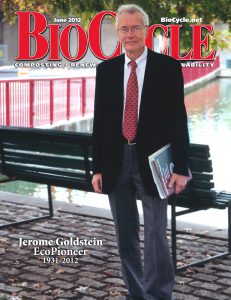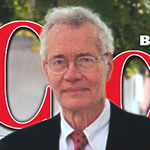Nora Goldstein
BioCycle June 2012, Vol. 53, No. 6, p. 4
 Is there significance in the fact that national and global environmental “issues of the day” in the 1960s and 1970s are strikingly similar to those in the second decade of the 21st century? Should we be depressed by that reality? We gave this some thought, and believe Jerry’s response would be somewhere along these lines:
Is there significance in the fact that national and global environmental “issues of the day” in the 1960s and 1970s are strikingly similar to those in the second decade of the 21st century? Should we be depressed by that reality? We gave this some thought, and believe Jerry’s response would be somewhere along these lines:
Given the reality that national and international corporations built upon virgin materials and fossil fuels are still pouring billions of dollars into mining, drilling and fracking for natural resources, pumping chemicals into depleted soils to grow food, and spending hundreds of millions of dollars lobbying against environmental regulations related to air and water pollution and waste diversion, I’d say the fact that we have composting, recycling and renewable energy industries making the inroads they are is reason enough to be optimistic. Everyone should be proud that we have gotten as far as we have today. Enough people recognize, and are benefitting from, recovery and reuse of natural resources to ensure that their communities will have clean water, clean air, healthy soils and food, and renewable supplies of power and fuels.
Chances are that Jerry would be less nerdy and wordy in his response, but we believe that is what his message would have been to the BioCycle community. At his core, Jerry was pragmatic, identifying the steps and initiatives to just get started, while providing encouragement and many models via project profiles. He had little patience for negativism (not worth the time and energy). But he had a vast amount of patience for positivism — we can do this, let’s just do it, learn and improve. A good way to describe Jerry’s outlook is: If one person or community is doing something, it’s a pilot; if two or three are, they are models; when we hit eight to ten, it’s a trend!
A flavor of the visionary elements of Jerry’s life and legacy can be sampled in our Tribute starting on page 34. Here are a few more samplings, culled from his editorials in Compost Science, BioCycle’s original name:
“Garbage To Gold — And Back Again,” Autumn 1962: Composting is a practical and economical treatment method. It doesn’t need embellishment with claims of gold, nor should it be saddled with the speculative risks associated with gold rushes.
“On Making An ‘Effluent’ Society,” Spring 1964: The time to develop new attitudes and solutions to pollution problems is long overdue. To delay any longer is both shameful and dreadful to contemplate. Such delay must be tolerated no longer.
“The Improving Socioeconomics of Composting,” March/April 1975: The issue of waste management has left the confines of the engineering department. Waste management is now interwoven with the entire fabric of our society. The question is no longer whether the socioeconomics are right for composting. Instead, it’s when our nation’s and the world’s policy-makers will make the discovery.”
The world has lost one of its leading advocates for peaceful coexistence with the planet. Thank you, Dad, for all that you did. Our family, and the BioCycle community, are proud to carry on your life’s work.










